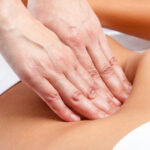Are you one of those weekend warriors with the urge to go out for a run, play a round of golf or tennis now that we are into the New Year? Are you on the rebound from an injury returning to the active lifestyle you have been determined to get back?
Returning to an exercise routine or starting a new routine after taking months off is a wonderful thing for the body. However, have you ever experienced muscle soreness for days after exercising? Sometimes it feels like you can barely get out of bed or walk downstairs.
Why is that?
Delayed onset muscle soreness is common, especially when returning to an activity you haven’t participated in for a while. There is a build up of lactic acid in our muscles that can take 2-3 days to settle in. A decrease in blood flow, red blood cells and oxygen to our muscles also contributes to dehydration, soreness and cramps.
Aside from muscle soreness, you may also be at higher risk for injury when returning to an activity you haven’t participated in for several weeks or months.
As a physical therapist, I educate my patients about this as they start feeling better from an injury and begin a gradual return to regular exercise.
Your muscles are not as strong, flexible and and may not react as quickly. More importantly, we must not forget about our heart. It is a muscle too. If it hasn’t been working that hard in the last couple of months you will probably find yourself huffing and puffing with fatigue after a 20 minute run rather than your usual hour. If you find yourself straining to reach that sixty-minute mark, your muscles are at risk of injury because they may not be getting sufficient oxygen and blood giving them the stamina they need. Here are some tips on how you can make your exercise routine effective and FUN while getting back into shape without causing too much soreness or possible injury.
1. Hydrate:
Drink plenty of water BEFORE you exercise. Don’t wait to drink fluids after your workout or when your body tells you it is thirsty. Make sure to get a balance of water and electrolytes prior to working out. You may not experience as much soreness. Your muscles will thank you.
2. Warm-up:
Go for a 10-15 minute walk before you jump into your run, soccer scrimmage or golf game. Walking gets the heart pumping and muscles warm.
3. Mini-workouts:
Rather than going full speed, mentally prepare for a shorter workout. Start with a twenty or thirty minute workout instead of your usual sixty or ninety minute routine. You will experience less soreness giving your body the chance to exercise a few days later.
4. Cool Down:
Finish your work out with another 10-15 minute walk or stretching routine. Now that your muscles are really warm, they appreciate a cool down. Muscles also prefer to be stretched when they are warm, which is why I recommend you stretch AFTER you work out rather than before.
5. Mix it Up:
We all tend to stay in our comfort zone, returning to the same routine over and over again. So mix it up. Do the usual routine one-day and try something different a couple days later. Providing balance is essential and can help decrease soreness and prevent injuries before they start.
6. Goals:
Sometimes we set lofty goals or new years resolutions that we never accomplish. Be realistic. Are you really going to go to the gym 5 days a week? Those who start out this way tend to fade and may stop going altogether. Start out 1-2 days a week and maintain that routine for at least a month before adding another day.
7. A Day Rest:
Make sure to give your body a day’s rest. Your entire system can benefit from a day’s rest between workouts on the weekends. Not to mention, this can prevent burn out.
8. Healthy Eating:
Make sure to nourish your body after you exercise with the right fuel. Have a snack that will replenish your muscles. Avoid sugary or processed foods. Eat a snack with protein as muscles thrive on protein rich foods.
Whether you are an athlete, are returning to exercise after an injury or are generally active, delayed onset muscle soreness can happen to any of us who are returning to exercise or are boosting their workouts. Keeping these suggestions in mind will help in prevention and/or recovery.
Photo Credit: costanavarino via Compfight cc
















